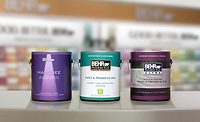J.D. Power Study Reveals Insights into Evolving Customer Needs and Demands

BartekSzewczyk, Creatas Video+ / Getty Images Plus, via Getty Images
J.D. Power has released its 2022 U.S. Paint Satisfaction StudySM, which examines what drives satisfaction among paint and stain customers. The study’s results may help brands and retailers partner together to better meet the needs of their customers. PCI reached out to Christina Cooley, Director of the Home Intelligence Practice at J.D. Power, to gain some deeper insights into the report.
PCI: How many people did you survey for this study?
Cooley: The J.D. Power U.S. Paint Satisfaction Study is based on responses from 5,015 customers who purchased and applied interior paint, exterior paint, and/or exterior stain in the past 12 months.
PCI: What key drivers of satisfaction did you evaluate amongst paint buyers?
Cooley: The overall customer experience is based on four key drivers of satisfaction: application, durability, offerings, and price. The study also examines the customer experience with their paint retailer based on online experience, in-store experience, service and staff, merchandise, and price.
PCI: What other areas of the customer experience do you examine in the survey?
Cooley: In addition to providing the paint industry with insights into the evolving needs and demands of customers, the study also explores the key drivers of satisfaction when it comes to the retailer from which consumers purchased their paint. It allows the paint industry to gain insight into brand image and reputation; to better understand the pathway to purchase and the online and in-store experience, as well as application behaviors; to ascertain what problems are emerging and why; and to better understand what drives customer loyalty.
PCI: What are the main segments included in the study, and how are they broken down?
Cooley: The J.D. Power Paint Satisfaction Study is focused on four segments: interior paint, exterior paint, exterior stain, and paint retailer. The brand that ranks highest in each segment can leverage their award publicly through the J.D. Power award licensing program.
PCI: What do the results of the study say about architectural paint purchases during the pandemic — both on the behalf of the customers and the retailers?
Cooley: Painting a home continues to be one of the most common, yet impactful home improvement projects consumers undertake. Manufacturers rely heavily on loyalty in terms of both repeat purchases and positive recommendations. Loyalty can only be achieved by truly understanding customers’ attitudes, preferences, and ultimately delivering an outstanding customer experience. The do-it-yourself trend will continue, so there’s a huge opportunity for both retailers and brands to partner and focus on training salespeople well, even with the challenges of high turnover and supply chain issues. Retailers and paint brands need to meet the needs of shoppers relying on in-store guidance and support during their purchases. The best way to do this is to distinguish themselves through the staff and the experience they provide.
Intentions for home purchases and home improvement projects have changed little since 2021. About 5% of J.D. Power’s 2022 Paint Satisfaction Study respondents plan to purchase a home in the next three months, while over one-third are working on, or planning, a home improvement project. Approximately six in 10 customers select their retailer first, which can put some paint and stain brands at a disadvantage. In-store purchases have increased slightly as COVID restrictions begin to lift. There is no difference in satisfaction between in-store buyers and online buyers for any of the three segments. Another indication of the lifting COVID restrictions impacting shopping behavior is the lower proportion of online buyers not feeling safe/comfortable inside the retail store, across all three segments.
PCI: How did the major paint manufacturers rank in the study?
Cooley: The figures below show the overall customer satisfaction ratings for interior paint, exterior paint, exterior stains and retailers.




Looking for a reprint of this article?
From high-res PDFs to custom plaques, order your copy today!






